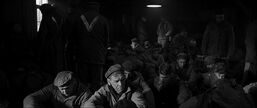"The Imposter" is a black-and-white German reflection on World War II directed by Robert Svenk, who once made "The Time Traveling Wife".
The film tells the story of a nineteen-year-old ordinary defenseman who pretended to be an air force captain during the last period of World War II and became a murderer. Won the Best Cinematography Award at the 65th San Sebastian International Film Festival.
The film is based on the true story of World War II, and the protagonist is Willie Herold, who is historically known as "The Executioner of Emsland". He was conscripted for military service at the age of 18 and later sent to Italy to fight in the war.
Awarded a First Class Medal for destroying two British tanks in a war, at the age of 19 he was separated from the troops in a retreat, and the story of the film begins at this time.
After watching the film, I know it, but unlike the film, he was wrongly released after being arrested and tried because of the chaos of the war at that time. Herold was not really punished until he was re-arrested by the Royal Navy in 1946 for stealing bread.
After verification, Herold and his party killed 125 people. He was sentenced to death at the age of 21.
It is worth noting that the director used "black and white" tones when expressing this story to achieve the effect of isolation from the real world. It is not necessary to use the same color as reality. On the one hand, it is because the story is too cruel and dark. If there is too much connection with reality, the audience cannot accept it emotionally.
At the same time, it is also easier to wear, so the director uses "black and white" to remind everyone that "this is a story" to reduce the audience's mental burden when substituting characters.
The sound design of the film is undoubtedly very good. There is no music in many bridges, but the sound of the scene is used instead of the background sound. These real dog barks, wind and gunfire created a chilling and chaotic atmosphere, giving the audience a strong sense of presence. The film also won the "Best Sound Design" award at the 31st European Film Awards.
From the plot point of view, on the way to "Fake Captain", the protagonist is actually full of loopholes. Too long trousers, refused to show the soldier's card, and met an old enemy that he never forgets.
But every time he was able to save himself when he was about to be exposed, the reason was that he had something to use. The deserters should follow the "captain" to avoid being hunted down. The innkeeper prefers to believe that there is real compensation, and the commander in the camp needs the power of the envoy of the head of state to resolve the impasse.
In addition to getting what they need, there are deeper reasons why the protagonist was not exposed. That is, at the moment of meeting him, people have actually "give up thinking". At that time, there seemed to be two choices before them, "believe" and "unbelief."
But in Germany at that time, people had no reason to suspect a "Führer's special envoy" wearing a "captain's uniform" and shouting "Long live Hitler".
That is to say, they "actively decided" to believe him not entirely out of rational judgment of interests, but under the influence of a powerful symbol system and social label system. It's just that they didn't realize it themselves, and they thought that they were "chosen" after thinking, which is really very emotional.
There is also an Easter egg behind the shady scene in the movie. The male protagonist, carrying a military vehicle with the words "Temporary Military Court", crossed the streets of modern Berlin, Germany. He was surrounded by his men in a Nazi uniform and began to face the road on the street. People openly searched, looted, this is the real Berlin street scene.
The actors are also real passers-by, not actors. Facing the unreasonable actions of the protagonist and his party, they were either puzzled or fearful, but most of them chose to obey. Isn't such a scene very similar to some scenes in the movie? Why can the protagonist succeed after replacing the people of World War II with modern people?
The crux of the problem may still lie in the military uniform, the weapons they hold, and all kinds of equipment that make them look professional. It is particularly important to note that they did not use the weapons in their hands, and passers-by did not think to check the authenticity of the weapons. Because as long as there are these "military uniforms", "weapons" and "equipment", it is easy for people not to go deep into the logic behind their actions. Even if you think it is wrong to do so, you will subconsciously obey.
In this regard, psychologist Milgren once conducted an experiment, he recruited a group of participants of different ages and occupations. And tell them that this is an experiment to test the effect of corporal punishment on learning behavior, and the participants will randomly select the role card of "teacher" or "student".
Teachers ask questions, students answer. Students who answer incorrectly will be punished with electric shocks, and if they answer incorrectly, the voltage will increase in turn. During this period, the "teacher" and the "student" were separated by a wall, and only voices could be heard, but the two did not see each other. Next, in order to better illustrate the experimental process, I will repeat the experimental steps in detail. If you are interested, you can imagine yourself as a "teacher" and see what choices you will make.
The student answered the first question wrong, the voltage of the shock machine is 45V. Then the student answered the next question incorrectly and the voltage rose to 75V. The student felt pain and started muttering. When it reached 120V, the student suddenly shouted and kept banging on the wall. This is the "teacher" who may have realized that the student was hurt, and turned to the experimenter who had been sitting beside him for help. Next, the experimenter in uniform will tell the teacher the "please continue" instruction. The teacher continued to ask questions, and the student gave the wrong answer again, the voltage rose to 150V, and the student shouted "I have a heart attack, I want to quit the experiment" on the other side of the wall. However, the experimental staff on the side still indicated that they could continue to ask questions, and promised that the "teacher" would not bear any responsibility for this. After getting the guarantee, the "teacher" chose to continue until the voltage exceeded 330V, and there was no sound from the students, and the experiment ended.
You may think that you must not be this cruel "teacher". It should be noted that during the experiment, the "students" were not really harmed. They are played by staff and the electric shock punishment is not real either. Those screams and wall-beating sounds were pre-recorded by the staff, and each participant was assigned the role of a "teacher".
And this experiment is to test, "how much power can human nature resist when encountering an order from an authority that goes against conscience." Guess how many people stopped this inhumane behavior midway through? The results of the experiment may have surprised everyone, with each participant offering to pause and question the idea of the experiment when the voltage reached a certain value.
But after authorities expressed their support, no one insisted on stopping before 300V, and 65% of the participants reached the limit of 450V.
An experienced participant once wrote that when he wanted to stop in the middle of being a "teacher", he suspected that "the whole experiment may have been designed to test whether ordinary people would follow orders against their moral conscience, like the Germans." as in the Nazi era".
When a person is given the power to harm others, if there is a uniform, position, professionalism, or a concept that seems "reasonable". For example, the "deserters" in the movie have been sentenced to death, and their existence endangers the combat effectiveness of the German army, so people are likely to do terrible things.
Both the Milgren experiment and The Fake Captain give us the answer to that question, like a veteran ordered down a corpse pit, or an actor who shoots deserters. They gave up the kindness and compassion they once believed in, and subconsciously obeyed orders. This kind of "sinful without knowing it" behavior was summed up as "banal evil" by a famous Jewish political thinker Hannah Arendt.
It refers to the elimination of one's own thoughts, the unconditional obedience to given orders, or the "evil" of giving up personal value judgments. At the end of the film, it is far from the history that people can easily escape from.
The director designed this contemporary easter egg. He warned people that evil is not far away, banal evils may still occur, and the "Nazis" may come back at any time. This is exactly what modern people in peaceful times need to be particularly vigilant about.
It is worth noting that "Fake Captain" was shot in Germany. As the provoking country of World War II, Germany has established a systematic mechanism to reflect on the war throughout the country after the war. In 1970, the then Chancellor of the Federal Republic of Germany, Willy Brandt, knelt in front of the Memorial to the Polish Jewish Victims. On Holocaust Remembrance Day in 2013, German Chancellor Angela Merkel stated that "Germany bears eternal responsibility for the crimes of the Nazis". In 2015, on the 70th anniversary of the end of World War II, German President Gauck and the public mourn the Soviet prisoners.
In addition, a large number of literary and film works delve into topics related to the Nazi system, war and human nature. Günter Grass, a German writer who won the Nobel Prize in Literature in 1999, is related to World War II in his masterpiece The Tin Drum.
He analyzed the blind obedience of the German citizens at that time, in order to resist the public's shunning of Nazi history. The TV series "Our Fathers", the movies "The Destruction of the Empire", "The Tide", etc., reproduce the tragic fate of the big and small people under the influence of the times, giving people a warning.
In addition, it is clearly stipulated in the German Education Law that German history textbooks must contain sufficient weight of Nazi history, and emphasizes the need to look at the issues involved in this historical period from multiple perspectives, reminding everyone to learn from it and always introspect. This reflects Germany's pragmatic and face-to-face attitude in reflecting on past mistakes, which is worthy of recognition.
Perhaps now it seems that the "World War II" that changed the world pattern in Thailand is far away. It is only a few pages in the history book, and it only exists in the video text or the dictation of the elders, but today, the power still exists.
At the beginning of the year, the news that "Syrian refugees tricked their 3-year-old daughter into laughing at the bomb" attracted widespread attention. A father was afraid that the days of war would leave his daughter traumatized, so he told his child that the sound of the bomb was the boys playing fireworks, and promised to laugh when he heard the sound. This is the most heart-wrenching lie a father can tell to protect his daughter.
Speaking of the movie, it's really shocking that a "captain's uniform" can allow Herold to commit such a crime against humanity and get the support of so many people around him.
When some authoritative label or external information is in front of them, people tend to believe it and obey the power it implies or represents. And this tendency is usually higher than we feel , the same sentence that the two said, it is difficult to be treated equally.
It is true that established systems of ideas in society are everywhere, and we are bound to be influenced by them. But we can always reflect on whether everything we do is really "right".
Look at the right and wrong of things from the heart, and even when people around you are influencing each other, retain your own independent judgment, and always be alert to dangerous thoughts. This may minimize tragedies such as "Fake Captain", which may also be the inspiration the film brings to us.
View more about The Captain reviews










